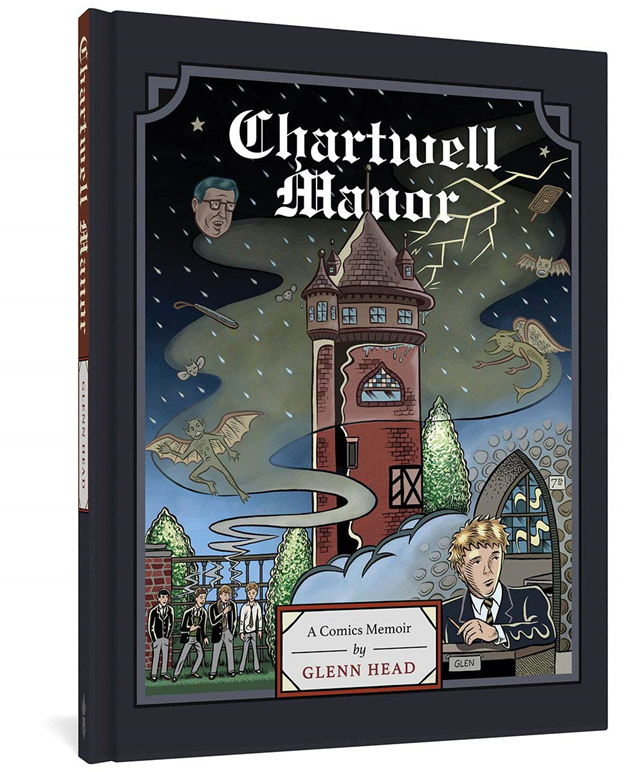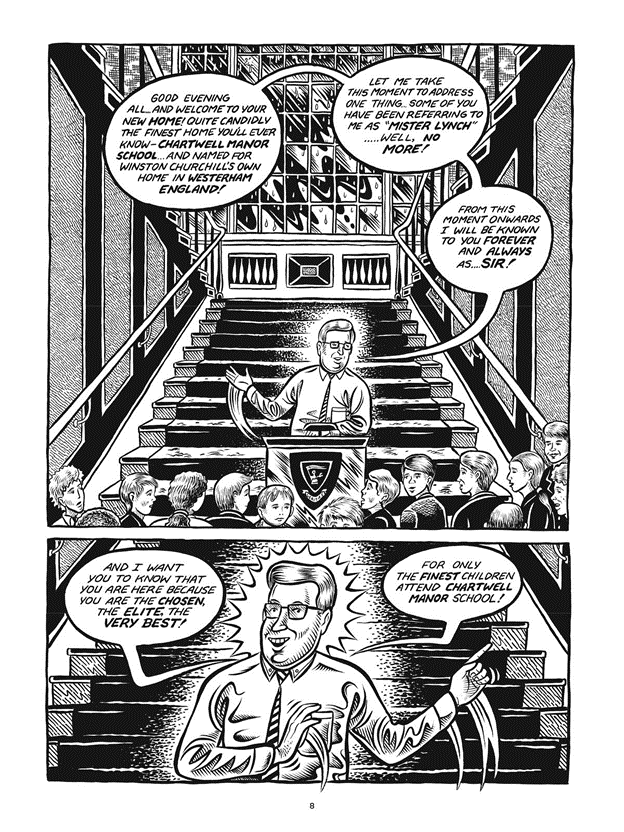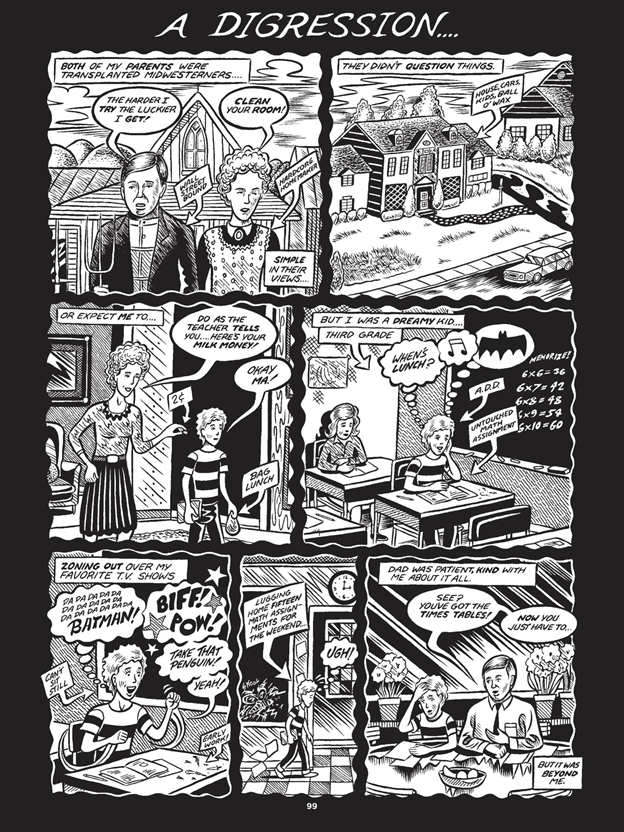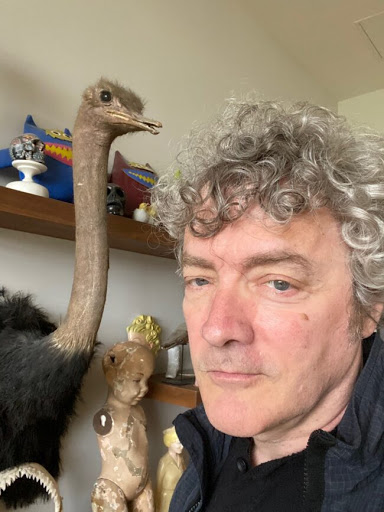Veteran cartoonist Glenn Head’s Chartwell Manor (Fantagraphics, 2021) is one of the most talked-about comics of the year to date, and, in this author’s own opinion, is one of the more riveting and harrowing works of memoir the medium has produced in some time, detailing as it does the long-standing patterns of sexual abuse at an exclusive boarding school and, perhaps even more crucially, the life-long effects of that abuse on those who survived it, in particular the cartoonist himself. I recently had the chance to speak with Head about its gestation, his creative process, the reception his work has received, what’s next for him on the horizon, and more —

RC: You’re probably getting asked this a lot, but was the process of writing and drawing Chartwell Manor more personally cathartic than it was difficult, or equal amounts of both?
GH: Well I have been getting that a lot, which is understandable. Anyone reading Chartwell Manor is presented with quite a can of worms that the author/artist is working out… But, in fact, it was really an enjoyable process, all of it. It wasn’t difficult. It’s partly my own defiance, to really look at things and just draw them, crazy things that I’ve experienced. It’s an exciting challenge for me as a cartoonist. Of course then you’ve gotta deal with what comes up, how people respond, but you know…
RC: Looking at your body of work, it feels as though this was perhaps a project you were, for lack of a better term, “working up to doing” for some time now. How accurate is that perception?
GH: Entirely true! Chartwell Manor is actually a book I was considering for decades before doing; all this time I’ve thought of it as the project that was waiting for me. I knew I had to do it, I just didn’t know how. Drawing my previous comics memoir Chicago showed me the way. Working in the graphic novel I saw what was really possible with it: depth of character, emotional content, nuance, and time passing—I don’t think you can really capture time as well in a regular comic. The point is, I needed to learn how to work in the graphic novel format before “working up to” this project.

RC: In a very real sense, this book feels like a companion piece to your previous long-form memoir, Chicago. From your own point of view, do you see it that way, and, if so, is it an expansion on its themes, a response to it, or some of each?
GH: Yes it’s definitely a companion piece to Chicago. What I’m working with here is a “cycle”, a trilogy of memoir comics with individual stories that connect, without overlapping, I’d say. There’s no hint of child abuse in Chicago, for instance (although my character, homeless and crazy and on the streets does have to fend off sex predators) ,but what these comics do have in common is the cartoonists’ life experience. Also, my comics are always about comics. Recurring themes in my work are the creative struggle, madness, and alienation.
RC: From a process perspective, did you have a particular place, time of day, or other “atmospheric conditions” that were most conducive for working on this book?
GH: Atmospheric conditions? I’ve got a good workroom I feel comfortable in. I know this dates me, but I’m a huge rock ‘n’ roll fan, so I listen to a lot of that and it’s a huge inspiration. The music of Iggy Pop and Lou Reed, and their self-punishing brutality was something I channeled when drawing Chartwell Manor. Especially the New York City scenes in the book.
I pretty much try to work 8 hour days, 10 to 6, 7 days a week.

RC: On a related note, how long did it take you to create it from start to finish, and what internal guidepost(s) let you know when you were well and truly done?
GH: I’m pretty sure it took me 5 years from start to finish, and I was really working almost entirely without a break. The occasional short trip here and there to the bathroom! Holidays too.
I know I’m finished when my wife, Xeni, tells me! Actually I’m really blessed to have such a great reader of my work as she is. So with Chartwell Manor there are 5 chapters, and I’d show her each one in breakdown form. She might say “No!” or “Well…okay!” Then I go ahead and draw it. She was incredibly helpful. She’s an excellent writer too.
RC: Have you shown the book to any of your Chartwell contemporaries, and, if so, what has their reaction been like?
GH: Not any of my contemporaries, but plenty of former Chartwell students have seen it. They all had great things to say about it. That was cool. Oh yeah, and one guy, the former student who was involved in getting Lynch, the pedophile, locked up–he wants a copy… I hope he likes it. He’s the hero of the book!
RC: Ditto for your family members, have they been supportive and/or encouraging? I’m thinking specifically of your mother, given her necessarily complex portrayal in the book.
GH: My mother died a few weeks before the book’s release. I don’t know what she would have thought of it, but my family doesn’t really follow my work, I don’t think. I don’t talk about my work to them unless they ask. On the other hand, Chartwell Manor got a lot of press, so I know they know about it. They haven’t said much if they’ve read it.
RC: Now that it’s out there in the world and engendering the reactions it has to date, is there anything present-day you would advise your past self at the start of the whole process if you could?
GH: Draw it exactly as you lived it! Don’t compromise. Tell it like it happened. I mean, make it a story! Give it verve, feeling, momentum….don’t forget entertainment! See these are all the things I kept in mind while drawing Chartwell Manor. I never let myself forget that I’m just a comic book artist.
RC: Oftentimes, artists are their own harshest critics, but it’s always important for people, regardless of occupation, to congratulate themselves on a job well done, especially when it comes to solitary endeavors such as cartooning. Are there any particular scenes or passages in Chartwell Manor that made you say to yourself “I got that exactly right” while you were making them? And, are there others that stand out now as being especially strong that maybe didn’t seem that way at the time?
GH: Where I know I got it exactly right? Drawing Terence Michael Lynch, the headmaster/pedophile. I nailed that motherfucker. Everything about him, from the florid speech patterns, to the larger-than-life charlatan charisma. I got him! You see him in my book exactly as he was.
The interesting thing I’m also seeing that I got is my own tendency towards being a passive observer. If I was just a little more “involved” emotionally with this book’s content I might never have been able to draw it.

RC: To wind the time machine back a LONG way here, is autobio/memoir something you always had an interest in pursuing, even when you were doing more “far-out” stuff early on?
GH: Actually no. I went through a sort of a “Gimme the crazy shit!” mindset, early on. You know, I loved Crumb, Wilson, the troublemakers, then I got into the pure entertainment yuks of Shelton’s “Freak Brothers.”
Finally when I was at SVA I took courses with Art Spiegelman who insisted on auto-bio, which really pushed me into doing it. It got a good reaction, even from my toughest critics, like Art, and Mark Newgarden. So auto-bio, you know, it’s kind of the grown-ups table, you know, like….Serious Comics!! So hey, who wants to be serious all the time?
I eventually realized that my auto-bio could really be just as weird ‘n’ crazy as anything I might invent. Of course my personal history is, you know, in some spots…. Out There!
RC: On the other side of the coin, is it now the field/genre you’re most comfortable working in, or do you see yourself returning to fictionalized narrative at some point?
GH: Well, right now, I’m in the middle of my third comics memoir; it’s going into crazy places, though they were places I was in…It’s definitely going to have a mix of the real and the really bizarre.
I’ve grown to love auto-bio because you can go deep. For my money, it’s really that simple. Take for instance, Robert Crumb. His deepest work? His auto-bio (okay Despair wasn’t exactly auto-bio, but it sorta was). His best work? Not for me to say. But yeah, with auto-bio I feel I can really say something. So it’s worth the effort. And let’s face it, comics are a lot of effort!
RC: Finally, any responses to date from other abuse survivors? If so, I’d like to keep it REALLY general out of respect for them and their situations, but have they found the process of reading it helpful or therapeutic in some way?
GH: Yeah, it sure seems like it! People who have been through what I’ve been through, they seem really grateful! And people who haven’t have also been very affected by it too. That’s very gratifying I can tell you!
SOLRAD is made possible by the generous donations of readers like you. Support our Patreon campaign, or make a tax-deductible donation to our publisher, Fieldmouse Press, today.

Leave a Reply